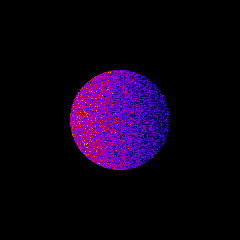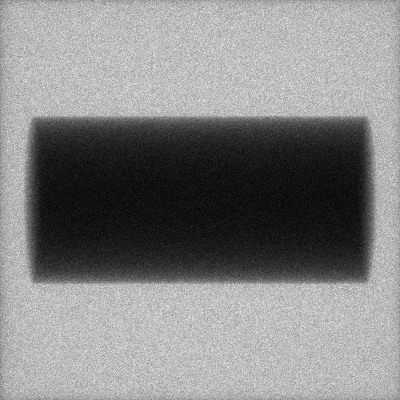Examples 5: World Tracking¶
In world tracking example, a cylinder is simulated computing absorbed dose inside it, a CBCT flat panel detector is also defined storing photon count. And finally a world is defined in order to store the fluence outside cylinder phantom and detector. An external source, using GGEMS X-ray source is simulated generating 1e8 particles.
$ python world_tracking.py [-h] [-d DEVICE] [-b BALANCE] [-n N_PARTICLES] [-s SEED] [-v VERBOSE]
-h/--help Printing help into the screen
-d/--device OpenCL device (all, cpu, gpu, gpu_nvidia, gpu_intel, gpu_amd, "X;Y;Z"...)
using all gpu: -d gpu
using device index 0 and 2: -d "0;2"
-b/--balance Balance computation for device if many devices are selected "X;Y;Z"
60% computation on device 0 and 40% computatio on device 2: -b "0.6;0.4"
-n/--nparticles Number of particles (default: 1000000)
-s/--seed Seed of pseudo generator number (default: 777)
-v/--verbose Setting level of verbosity
First the world is defined, and all output are generated
world = GGEMSWorld()
world.set_dimensions(200, 200, 200)
world.set_element_sizes(10.0, 10.0, 10.0, 'mm')
world.set_output_basename('data/world')
world.energy_tracking(True)
world.energy_squared_tracking(True)
world.momentum(True)
world.photon_tracking(True)
The created cylinder phantom is loaded and dosimetry module is associated to the cylinder phantom, and all output are activated
phantom = GGEMSVoxelizedPhantom('phantom')
phantom.set_phantom('data/phantom.mhd', 'data/range_phantom.txt')
phantom.set_rotation(0.0, 0.0, 0.0, 'deg')
phantom.set_position(0.0, 0.0, 0.0, 'mm')
dosimetry = GGEMSDosimetryCalculator()
dosimetry.attach_to_navigator('phantom')
dosimetry.set_output_basename('data/dosimetry')
dosimetry.set_dosel_size(1.0, 1.0, 1.0, 'mm')
dosimetry.water_reference(False)
dosimetry.minimum_density(0.1, 'g/cm3')
dosimetry.uncertainty(True)
dosimetry.photon_tracking(True)
dosimetry.edep(True)
dosimetry.hit(True)
dosimetry.edep_squared(True)
A CBCT flat panel detector is built
cbct_detector = GGEMSCTSystem('custom')
cbct_detector.set_ct_type('flat')
cbct_detector.set_number_of_modules(1, 1)
cbct_detector.set_number_of_detection_elements(400, 400, 1)
cbct_detector.set_size_of_detection_elements(1.0, 1.0, 10.0, 'mm')
cbct_detector.set_material('Silicon')
cbct_detector.set_source_detector_distance(1500.0, 'mm')
cbct_detector.set_source_isocenter_distance(900.0, 'mm')
cbct_detector.set_rotation(0.0, 0.0, 0.0, 'deg')
cbct_detector.set_threshold(10.0, 'keV')
cbct_detector.save('data/projection.mhd')
And finally an external source using GGEMSXRaySource is created:
point_source = GGEMSXRaySource('point_source')
point_source.set_source_particle_type('gamma')
point_source.set_number_of_particles(100000000)
point_source.set_position(-900.0, 0.0, 0.0, 'mm')
point_source.set_rotation(0.0, 0.0, 0.0, 'deg')
point_source.set_beam_aperture(12.0, 'deg')
point_source.set_focal_spot_size(0.0, 0.0, 0.0, 'mm')
point_source.set_monoenergy(60.0, 'keV')

Dose absorbed by cylinder phantom¶
Photon tracking in phantom¶

Cylinder projection on flat panel detector¶
World photon tracking¶
Performance:
Device |
Computation Time [s] |
|---|---|
GeForce GTX 1050 Ti |
363 |
GeForce GTX 980 Ti |
390 |
Quadro P400 |
908 |
Xeon X-2245 8 cores / 16 threads |
284 |